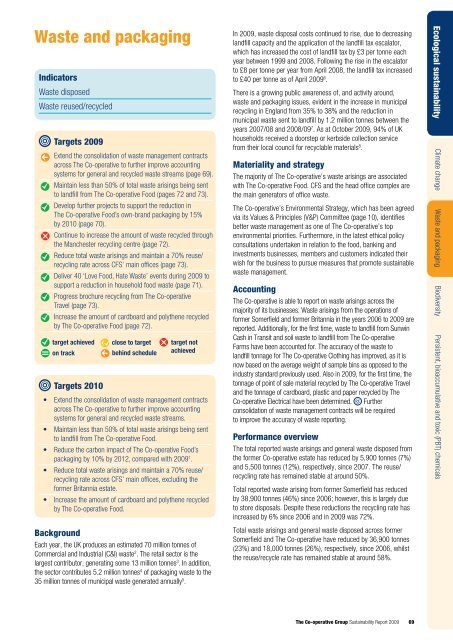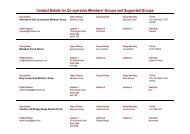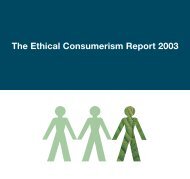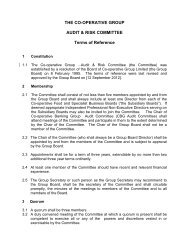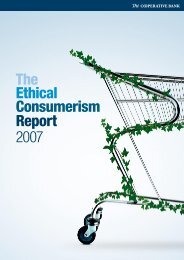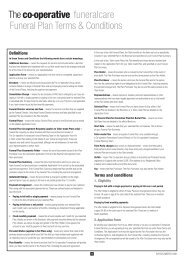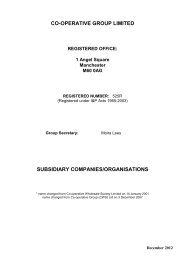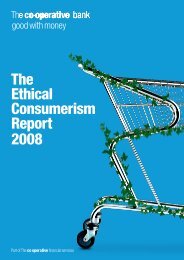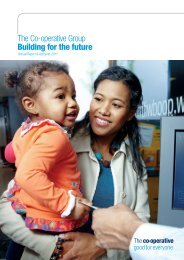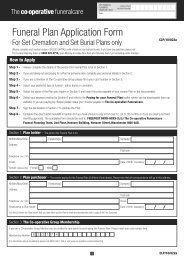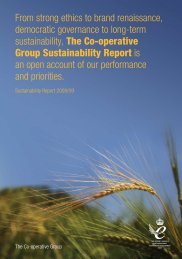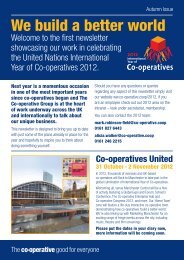Sustainability Report 2009 - The Co-operative
Sustainability Report 2009 - The Co-operative
Sustainability Report 2009 - The Co-operative
You also want an ePaper? Increase the reach of your titles
YUMPU automatically turns print PDFs into web optimized ePapers that Google loves.
Waste and packaging<br />
Indicators<br />
Waste disposed<br />
Waste reused/recycled<br />
Targets <strong>2009</strong><br />
Extend the consolidation of waste management contracts<br />
across <strong>The</strong> <strong>Co</strong>-<strong>operative</strong> to further improve accounting<br />
systems for general and recycled waste streams (page 69).<br />
Maintain less than 50% of total waste arisings being sent<br />
to landfill from <strong>The</strong> <strong>Co</strong>-<strong>operative</strong> Food (pages 72 and 73).<br />
Develop further projects to support the reduction in<br />
<strong>The</strong> <strong>Co</strong>-<strong>operative</strong> Food’s own-brand packaging by 15%<br />
by 2010 (page 70).<br />
<strong>Co</strong>ntinue to increase the amount of waste recycled through<br />
the Manchester recycling centre (page 72).<br />
Reduce total waste arisings and maintain a 70% reuse/<br />
recycling rate across CFS’ main offices (page 73).<br />
Deliver 40 ‘Love Food, Hate Waste’ events during <strong>2009</strong> to<br />
support a reduction in household food waste (page 71).<br />
Progress brochure recycling from <strong>The</strong> <strong>Co</strong>-<strong>operative</strong><br />
Travel (page 73).<br />
Increase the amount of cardboard and polythene recycled<br />
by <strong>The</strong> <strong>Co</strong>-<strong>operative</strong> Food (page 72).<br />
target achieved<br />
on track<br />
Targets 2010<br />
close to target<br />
behind schedule<br />
target not<br />
achieved<br />
• Extend the consolidation of waste management contracts<br />
across <strong>The</strong> <strong>Co</strong>-<strong>operative</strong> to further improve accounting<br />
systems for general and recycled waste streams.<br />
• Maintain less than 50% of total waste arisings being sent<br />
to landfill from <strong>The</strong> <strong>Co</strong>-<strong>operative</strong> Food.<br />
• Reduce the carbon impact of <strong>The</strong> <strong>Co</strong>-<strong>operative</strong> Food’s<br />
packaging by 10% by 2012, compared with <strong>2009</strong> 1 .<br />
• Reduce total waste arisings and maintain a 70% reuse/<br />
recycling rate across CFS’ main offices, excluding the<br />
former Britannia estate.<br />
• Increase the amount of cardboard and polythene recycled<br />
by <strong>The</strong> <strong>Co</strong>-<strong>operative</strong> Food.<br />
Background<br />
Each year, the UK produces an estimated 70 million tonnes of<br />
<strong>Co</strong>mmercial and Industrial (C&I) waste 2 . <strong>The</strong> retail sector is the<br />
largest contributor, generating some 13 million tonnes 3 . In addition,<br />
the sector contributes 5.2 million tonnes 4 of packaging waste to the<br />
35 million tonnes of municipal waste generated annually 5 .<br />
In <strong>2009</strong>, waste disposal costs continued to rise, due to decreasing<br />
landfill capacity and the application of the landfill tax escalator,<br />
which has increased the cost of landfill tax by £3 per tonne each<br />
year between 1999 and 2008. Following the rise in the escalator<br />
to £8 per tonne per year from April 2008, the landfill tax increased<br />
to £40 per tonne as of April <strong>2009</strong> 6 .<br />
<strong>The</strong>re is a growing public awareness of, and activity around,<br />
waste and packaging issues, evident in the increase in municipal<br />
recycling in England from 35% to 38% and the reduction in<br />
municipal waste sent to landfill by 1.2 million tonnes between the<br />
years 2007/08 and 2008/09 7 . As at October <strong>2009</strong>, 94% of UK<br />
households received a doorstep or kerbside collection service<br />
from their local council for recyclable materials 8 .<br />
Materiality and strategy<br />
<strong>The</strong> majority of <strong>The</strong> <strong>Co</strong>-<strong>operative</strong>’s waste arisings are associated<br />
with <strong>The</strong> <strong>Co</strong>-<strong>operative</strong> Food. CFS and the head office complex are<br />
the main generators of office waste.<br />
<strong>The</strong> <strong>Co</strong>-<strong>operative</strong>’s Environmental Strategy, which has been agreed<br />
via its Values & Principles (V&P) <strong>Co</strong>mmittee (page 10), identifies<br />
better waste management as one of <strong>The</strong> <strong>Co</strong>-<strong>operative</strong>’s top<br />
environmental priorities. Furthermore, in the latest ethical policy<br />
consultations undertaken in relation to the food, banking and<br />
investments businesses, members and customers indicated their<br />
wish for the business to pursue measures that promote sustainable<br />
waste management.<br />
Accounting<br />
<strong>The</strong> <strong>Co</strong>-<strong>operative</strong> is able to report on waste arisings across the<br />
majority of its businesses. Waste arisings from the operations of<br />
former Somerfield and former Britannia in the years 2006 to <strong>2009</strong> are<br />
reported. Additionally, for the first time, waste to landfill from Sunwin<br />
Cash in Transit and soil waste to landfill from <strong>The</strong> <strong>Co</strong>-<strong>operative</strong><br />
Farms have been accounted for. <strong>The</strong> accuracy of the waste to<br />
landfill tonnage for <strong>The</strong> <strong>Co</strong>-<strong>operative</strong> Clothing has improved, as it is<br />
now based on the average weight of sample bins as opposed to the<br />
industry standard previously used. Also in <strong>2009</strong>, for the first time, the<br />
tonnage of point of sale material recycled by <strong>The</strong> <strong>Co</strong>-<strong>operative</strong> Travel<br />
and the tonnage of cardboard, plastic and paper recycled by <strong>The</strong><br />
<strong>Co</strong>-<strong>operative</strong> Electrical have been determined. Further<br />
consolidation of waste management contracts will be required<br />
to improve the accuracy of waste reporting.<br />
Performance overview<br />
<strong>The</strong> total reported waste arisings and general waste disposed from<br />
the former <strong>Co</strong>-<strong>operative</strong> estate has reduced by 5,900 tonnes (7%)<br />
and 5,500 tonnes (12%), respectively, since 2007. <strong>The</strong> reuse/<br />
recycling rate has remained stable at around 50%.<br />
Total reported waste arising from former Somerfield has reduced<br />
by 38,900 tonnes (46%) since 2006; however, this is largely due<br />
to store disposals. Despite these reductions the recycling rate has<br />
increased by 6% since 2006 and in <strong>2009</strong> was 72%.<br />
Total waste arisings and general waste disposed across former<br />
Somerfield and <strong>The</strong> <strong>Co</strong>-<strong>operative</strong> have reduced by 36,900 tonnes<br />
(23%) and 18,000 tonnes (26%), respectively, since 2006, whilst<br />
the reuse/recycle rate has remained stable at around 58%.<br />
Ecological sustainability Climate change Waste and packaging Biodiversity Persistent, bioaccumulative and toxic (PBT) chemicals<br />
<strong>The</strong> <strong>Co</strong>-<strong>operative</strong> Group <strong>Sustainability</strong> <strong>Report</strong> <strong>2009</strong> 69


